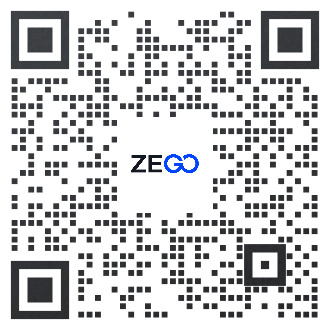- Documentation
- Super Board (Full version)
- Server API V2
- Callback of the transcoding status
Callback of the file transcoding status
Description
If you require notification of successful file transcoding, contact ZEGOCLOUD Technical Support to configure a callback URL. Then, the file transcoding server will send a request to the callback URL in POST mode.
Callback description
- Request method: POST/JSON
- Request endpoint: Contact ZEGOCLOUD Technical Support to configure the endpoint.
- Protocol: HTTPS
Request parameters
| Parameter | Type | Description |
|---|---|---|
appid |
Number |
App ID. |
event |
String |
Callback event. The return value is cvt_finish. |
nonce |
String |
String of random digits. |
signature |
String |
Verification string. For details, see Verification description. |
timestamp |
Number |
Current time of the server (Unix timestamp). |
data |
Object |
Response object. For details, see Data member list. |
The following table lists data members.
| Parameter | Type | Description |
|---|---|---|
file_id |
String |
File ID returned after successful transcoding. |
task_id |
String |
File transcoding task ID. |
status |
Number |
File transcoding status. For details, see the following table of status description. |
The following table lists the values of Status.
| Status code | Description |
|---|---|
| 16 | Transcoding succeeded. |
| 32 | Transcoding failed. |
| 64 | Transcoding task canceled. |
| 128 | Password-protected file. |
| 256 | The file is too large. |
| 512 | The Excel file contains too many sheets. |
| 1024 | The file is empty. For example, the PowerPoint file contains no slide. |
| 2048 | The transcoding server failed to open the file. |
| 4096 | The target file type is not supported. |
| 8192 | The source file is read-only. |
| 16384 | The transcoding server failed to download the source file. The possible causes are as follows:
|
| 32768 | Elements that cannot be processed by transcoding tools detected in the source file, such as ink marks and graffiti. Remove the elements and transcode the file again. |
| 32769 | The file format of the Word, Excel, or PowerPoint file is invalid. Ensure that the source file can be opened by Office before transcoding the file. |
Sample data
{
"appid": 123,
"data": {
"file_id": "ZYV-AFTrF6qnfFGW",
"status": 16,
"task_id": "9Y74yTsVd7e825-N"
},
"event": "cvt_finish",
"nonce": "6990248315071153368",
"signature": "1bb4db39726ee7f64c20ac0a71a730655b98ae2c",
"timestamp": 1627544014
}Verification description
To improve data security, the developer performs local signature calculation after receiving the callback from the ZEGO server and compares obtained signature with the file signature to determine whether the request is valid.
Encryption and verification
The encryption and verification flows are as follows:
)
The following table lists the parameters.
| Parameter | Description |
|---|---|
| callbacksecret | Verification key on the server. The verification key is generated when a project is registered on the ZEGOCLLOUD console, and you can select Console > Project Configuration > Server-End API Key to view the key. |
| timestamp | Unix timestamp. |
| nonce | Random number. |
Sample code
Refer to the following sample code for how to generate and verify the callback request signature.
- Sample code in PHP
// Obtain signature, timestamp, and nonce from request parameters.
$signature = $_POST["signature"];
$timestamp = $_POST["timestamp"];
$nonce = $_POST["nonce"];
$secret = callbacksecret;// Callback secret obtained from the background.
$tmpArr = array($secret, $timestamp, $nonce);
sort($tmpArr, SORT_STRING);
$tmpStr = implode( $tmpArr );
$tmpStr = sha1( $tmpStr );
if( $tmpStr == $signature ){
return true;
} else {
return false;
}- Sample code in Java
// Obtain signature, timestamp, and nonce from request parameters.
String signature = request.getParameter("signature");
long timestamp = request.getParameter("timestamp");
String nonce = request.getParameter("nonce");
// Callback secret obtained from the background.
String secret = callbacksecret;
String[] tempArr = {secret, ""+timestamp, nonce};
Arrays.sort(tempArr);
String tmpStr = "";
for (int i = 0; i < tempArr.length; i++) {
tmpStr += tempArr[i];
}
tmpStr = org.apache.commons.codec.digest.DigestUtils.sha1Hex(tmpStr);
return tmpStr.equals(signature);Sample output
$timestamp = 1470820198;
$nonce = 123412;
$secret = 'secret';
The original string to be encrypted after sequencing and splicing is 1234121470820198secret.
The encrypted result is 5bd59fd62953a8059fb7eaba95720f66d19e4517.Return response
If the HTTP status code is 2XX (for example, 200)" is returned, the callback succeeded. Otherwise, the callback failed.
Callback retry policy
If the ZEGOCLOUD server receives no response, a callback will be initiated again after 15 seconds. Callback can be retried at most twice.
- Free trial
- 提交工单咨询集成、功能及报价等问题电话咨询400 1006 604Get ConsultingScan Wechat QR code

